Ramadan at BU: A Photo Essay
A time of intense spirituality, the holy month is also a celebration of community and faith, on campus and around the world
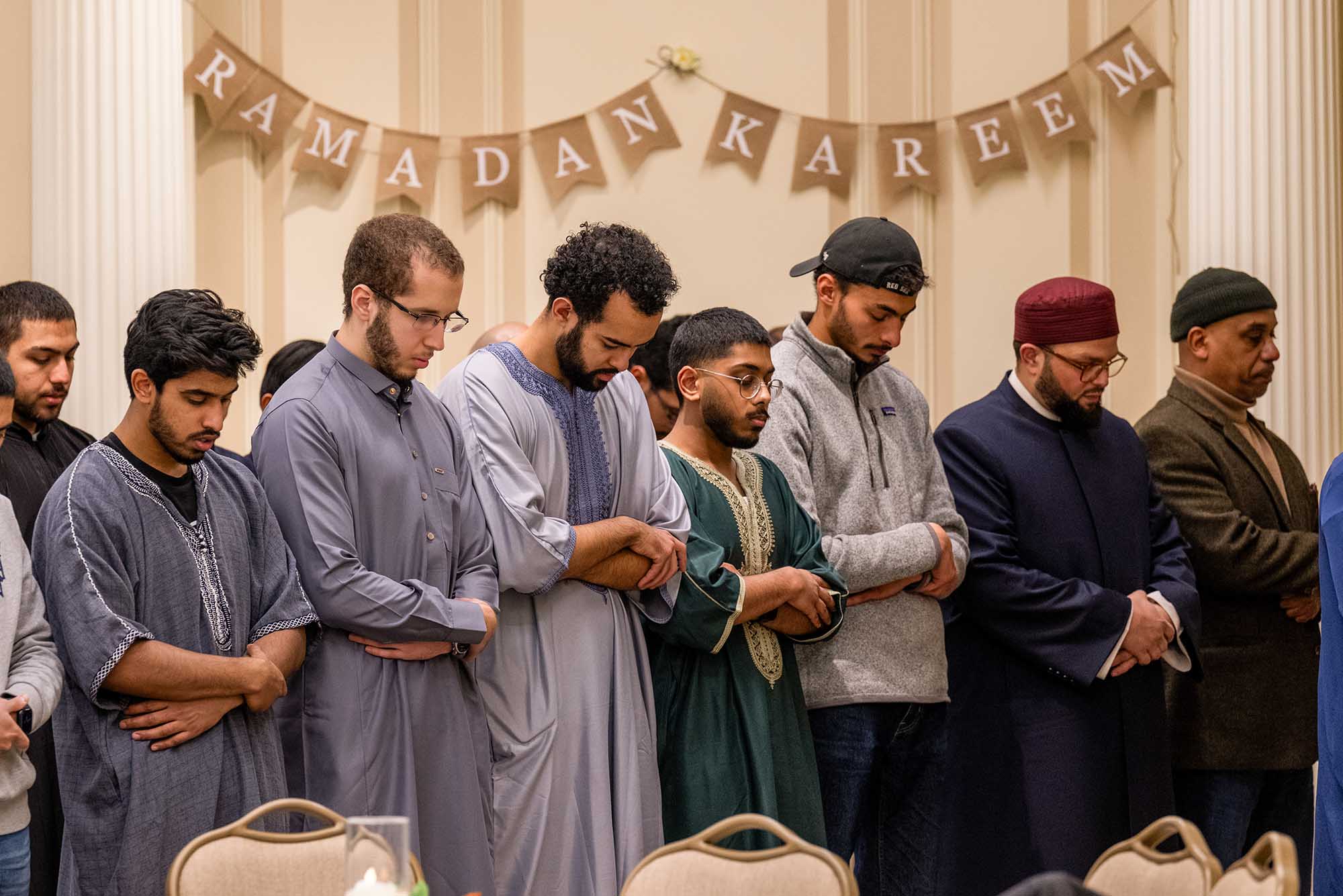
Attendees at the Inter-MSA (Muslim Student Association) Ramadan Iftar Banquet praying Maghreb in congregation. The event, held in the Metcalf Trustee Ballroom, brought together people from on and off campus to break fast and enjoy a meal together on the first night of Ramadan. It was cohosted by the Islamic Society of BU with Islamic Relief.
Ramadan at BU: A Photo Essay
A time of intense spirituality, the holy month is also a celebration of community and faith, on campus and around the world
Arooj Kamran had been looking forward to the month of March all year long. In reality, the Boston University computer science and political science major had been looking forward to it since early April last year.
For Kamran (CAS’25) and millions of other Muslims throughout the world, this anticipation has nothing to do with the first blooms of spring after a long, cold winter. What she was looking forward to was observing Ramadan, the ninth month in the Islamic calendar and the holiest month of the year (February 28 to March 30 in 2025).
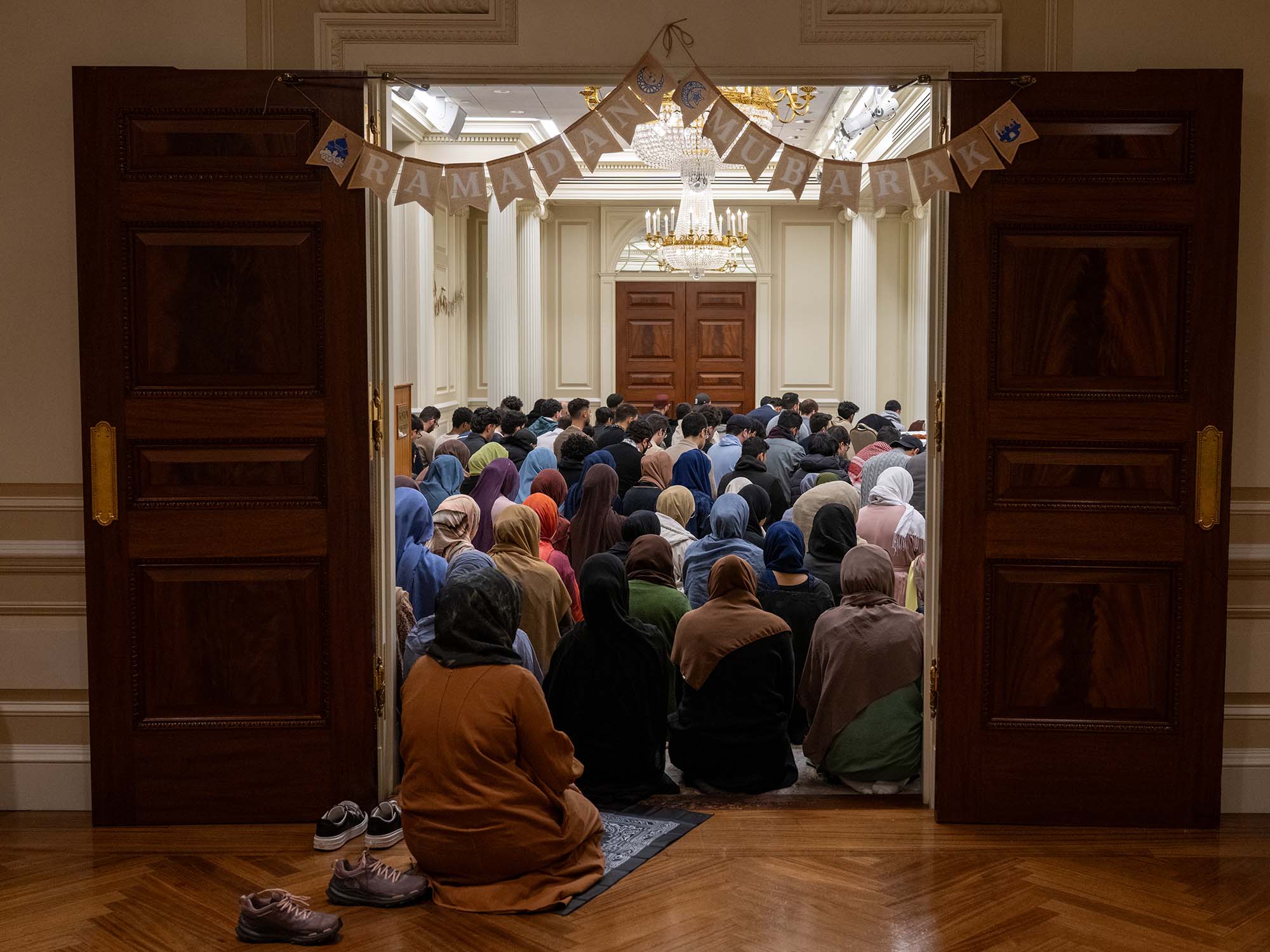
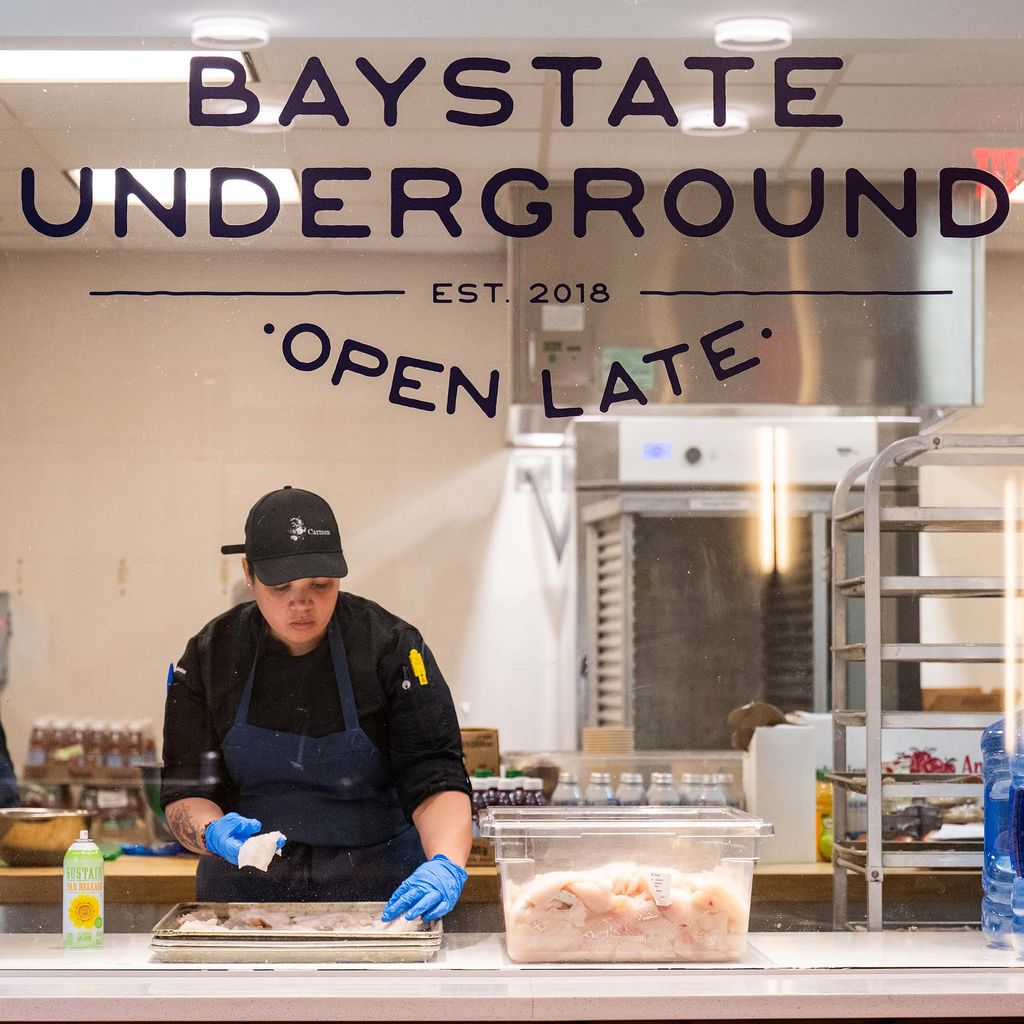
Cook Carmen Arroyo helping prepare the iftar meal for the evening at Bay State Underground, which offered iftar meals every weeknight during Ramadan.
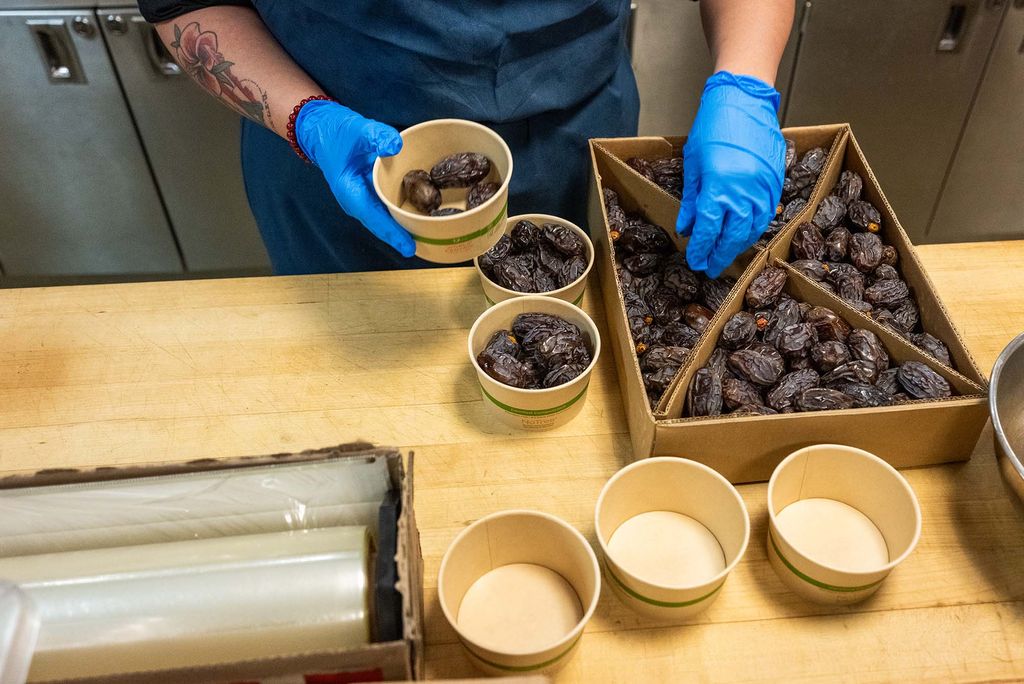
In Islam, the prophet Muhammad broke his fast with fresh dates. If there were no fresh dates, then dried dates were substituted, and if there were no dried dates, then observers took a few sips of water. Today, Muslims will most frequently break their fast at sundown with some dates and water. Cook Carmen Arroyo packages up dates to be added to the to-go suhoor meals at Bay State Underground. With the dates are apples, bagels, granola, juice, water, and yogurt. Arroyo has gotten to know the students over the past month and adjusts the orders according to their preferences. “I like getting the students what they need, and I like making them happy,” she says.
Click on the above photos for captions
“People are eager for this month. People are so excited when it’s coming,” says Kamran, who is also the advocacy chair for the Islamic Society of Boston University.
The annual observance of Ramadan is regarded as one of the five pillars of Islam. It lasts 29 to 30 days, from one sighting of the crescent moon to the next (a period set according to the Islamic calendar), and it is believed to be the time when the Quran was revealed to humanity. Muslims worldwide observe this holy month by fasting from dawn to sunset each day, devoting more time to prayer and spiritual self-improvement and joining together in community to share meals and traditions.
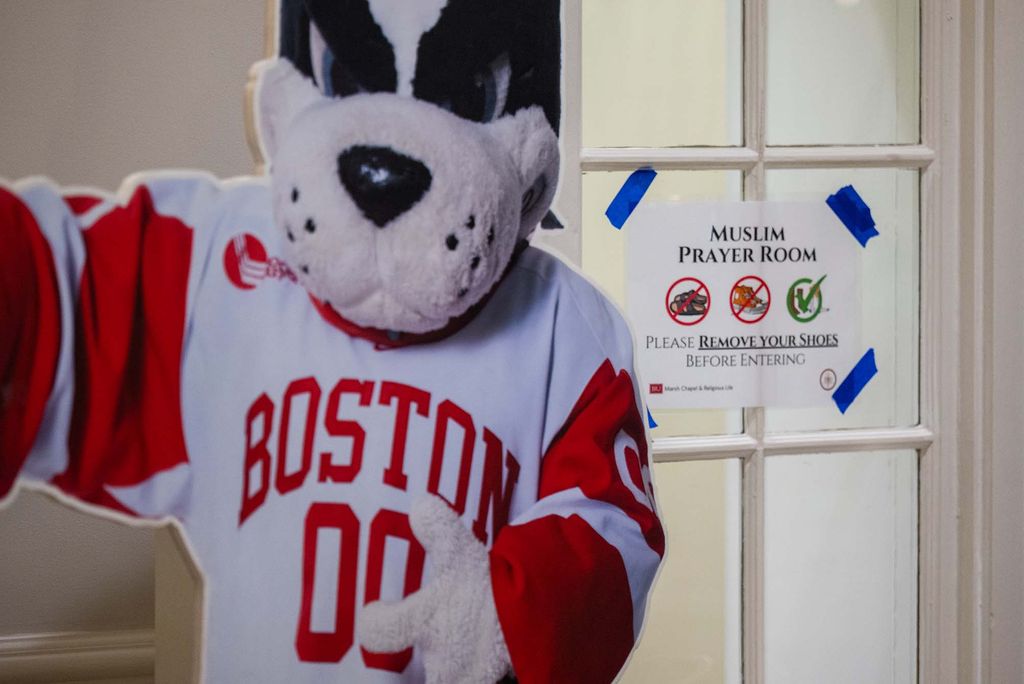
The Kilachand Honors College lounge was made into a prayer room for the month of Ramadan, providing observers a place to pray during the weekdays and evenings, with an easy walk across the street to Bay State Underground for iftar, the post sundown meal.
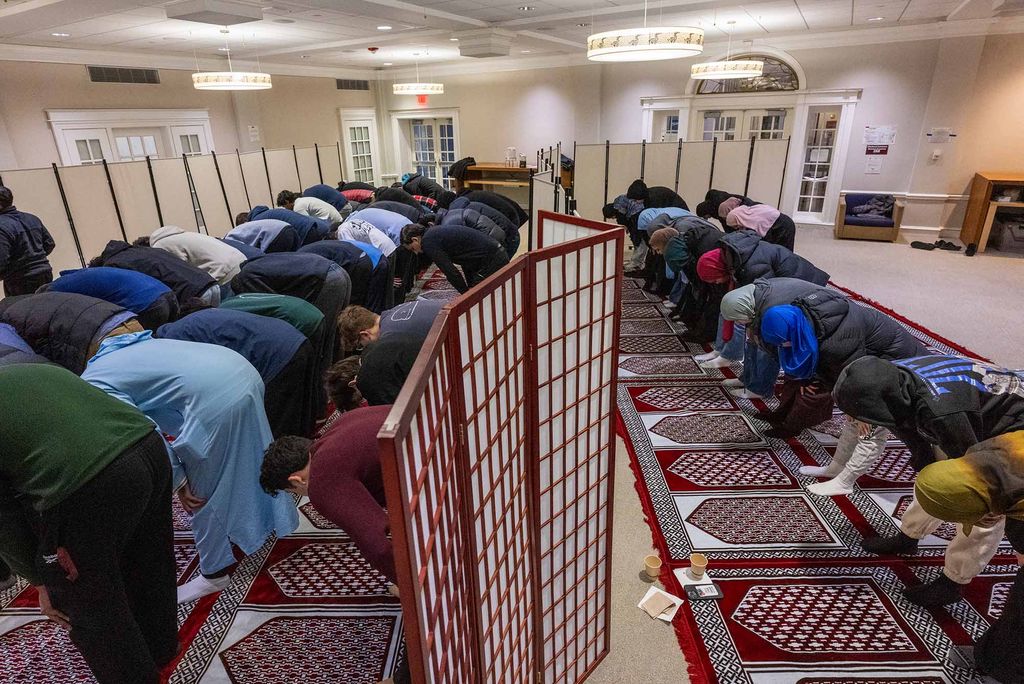
A panel separates men and women during prayer at sundown in the KHC lounge, which was repurposed as a Muslim prayer room for the month of Ramadan. Men are mandated to pray in congregation while women may pray at home.

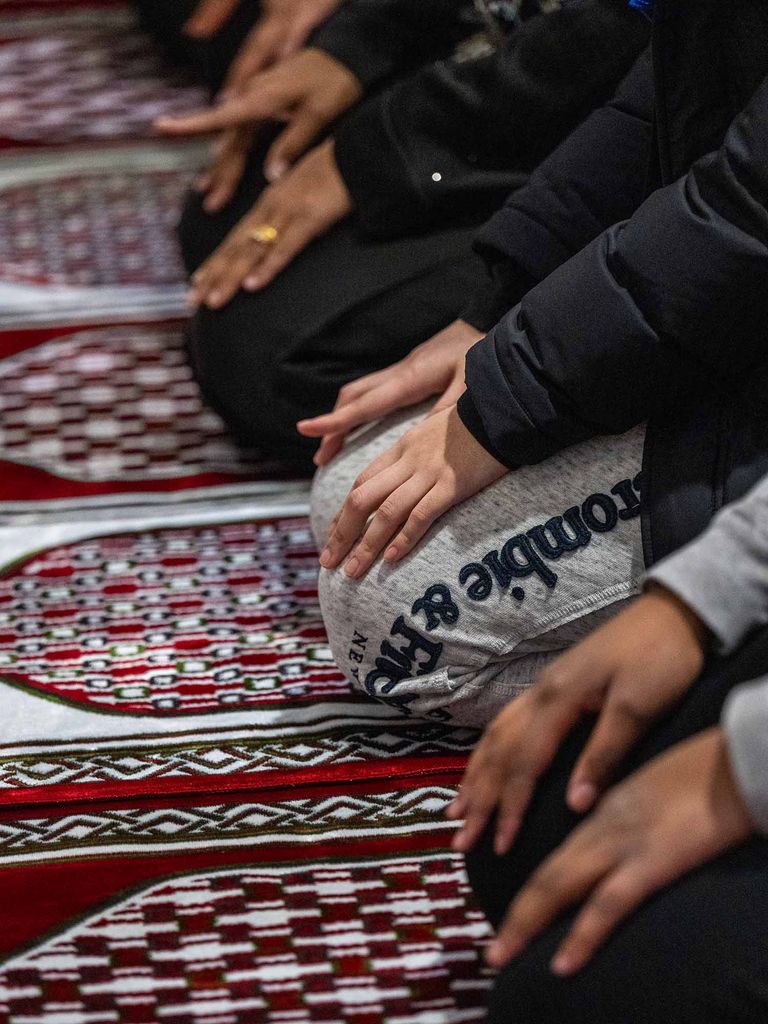
Young women sit in the final resting posture called Tashahhud while offering Maghreb prayer after breaking fast in the KHC lounge-turned–Muslim prayer room. “When we raise the index finger heavenwards, we say prayers that bear testimony to the oneness of Allah and the finality of the prophet of Muhammad (peace be upon him) and then send prayers and blessings upon him,” explains Naureen Mallick, a Marsh Chapel associate chaplain.
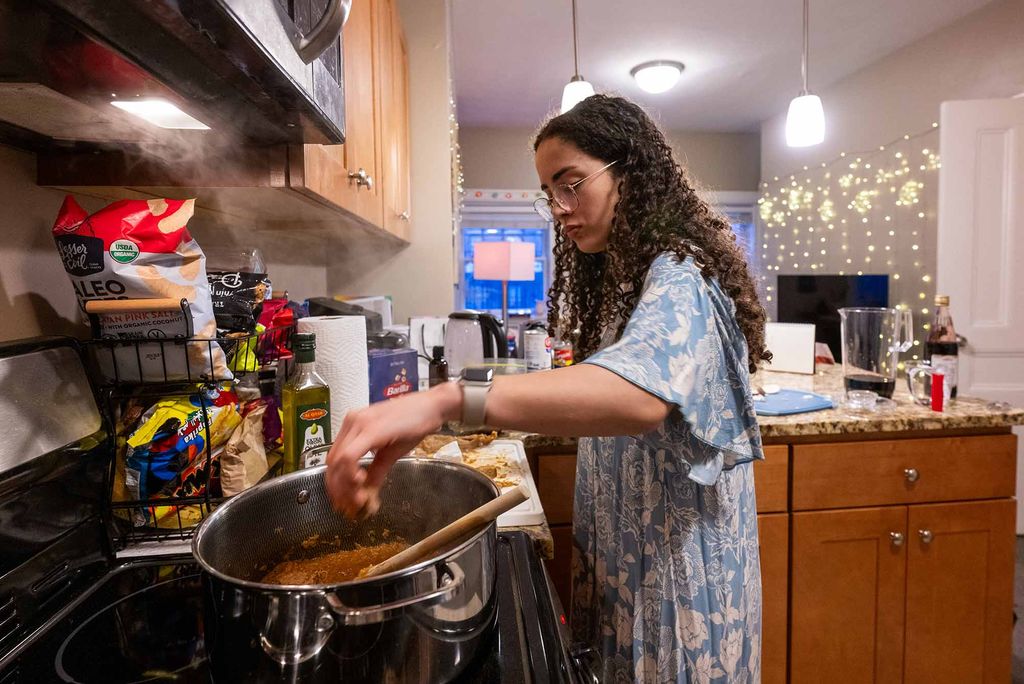
Jude Sleiman (SPH’25) preparing Imbakbaka, a Libyan dish with lamb, tomato, onion, a variety of spices, and pasta in her Bay State Road apartment. Sleiman was bringing the homemade dish to the sisters’ potluck iftar hosted at the GSU Terrace Lounge that evening. “It’s a labor of love with lots of steps and lots of ingredients,” says Sleiman, who learned how to prepare the meal from her mother via FaceTime. Others brought a variety: pizza and pasta, salads and chips, fruit bowls and cakes.
For those outside the religion, the most striking aspect of a Ramadan observance is this daylong fast. Practitioners observe a pre-fast meal, called the suhur, each day before dawn. Then they say the first prayer of the day, Fajr, which kicks off a stretch of about 12 hours without food or water. At specific intervals throughout the day, Muslims pray twice more. And then at sunset, observers break the fast with the iftar, a meal that traditionally starts by eating dates. They disperse again for Maghrib, the fourth of the five required daily prayers, then the main meal is served. During the final week of Ramadan, there are additional prayers—including overnight vigils—that practitioners often observe.
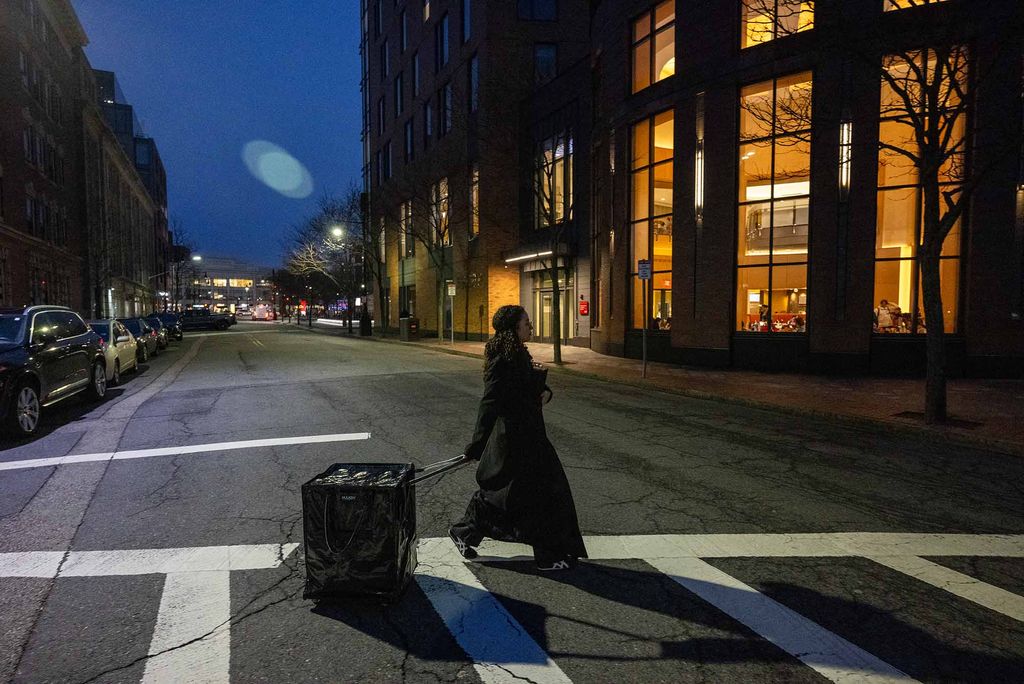
Carrying a homemade drink in a pitcher filled to the brim and a bag containing a pot of homemade Imbakbaka, Sleiman carefully walks the roughly four blocks from her apartment to the GSU for the sisters’ iftar potluck.
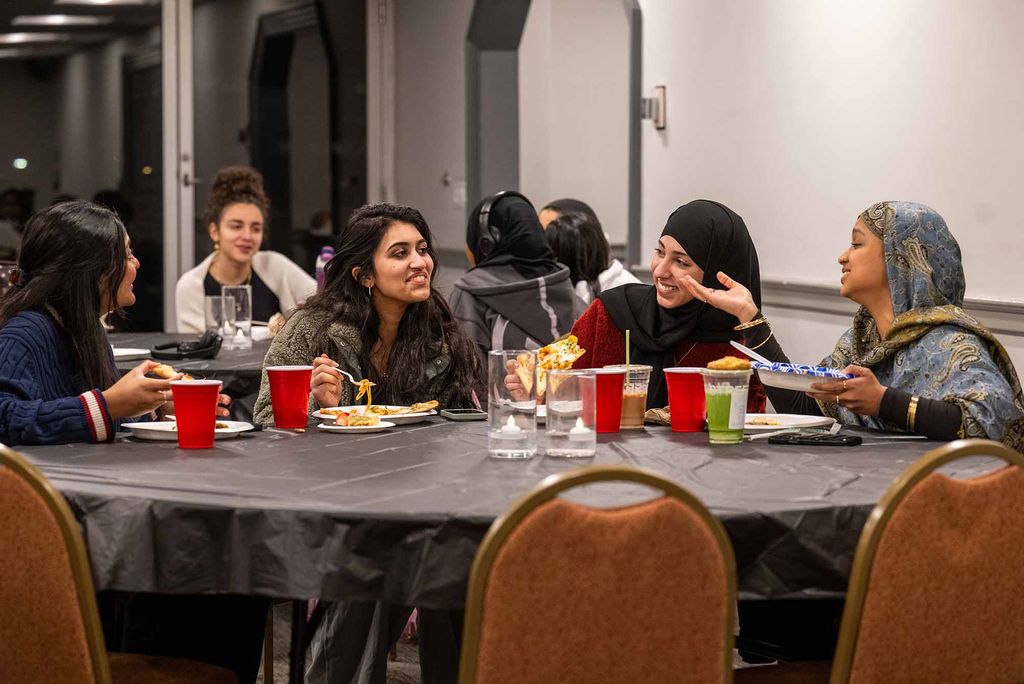
Arufa Khanom (CAS’25) (from left), Aleeza Shah (CAS’25), Aneesa Zubair, a student at St. Lawrence University, and Princess Ibtihaj, a student at Colby College, chat during the sisters’ iftar potluck in the GSU Terrace Lounge. “My connection with the sisters here at BU feels uniquely profound,” Shah says. “Back home, I practiced my faith mostly within family circles, but at BU, the sisters’ iftar events have introduced me to a diverse group of Muslim women from various backgrounds. Sharing iftar together in campus spaces from the GSU to Bay State Underground, with meals thoughtfully prepared by BU Dining Services, has fostered a deep sense of unity and belonging among us.”
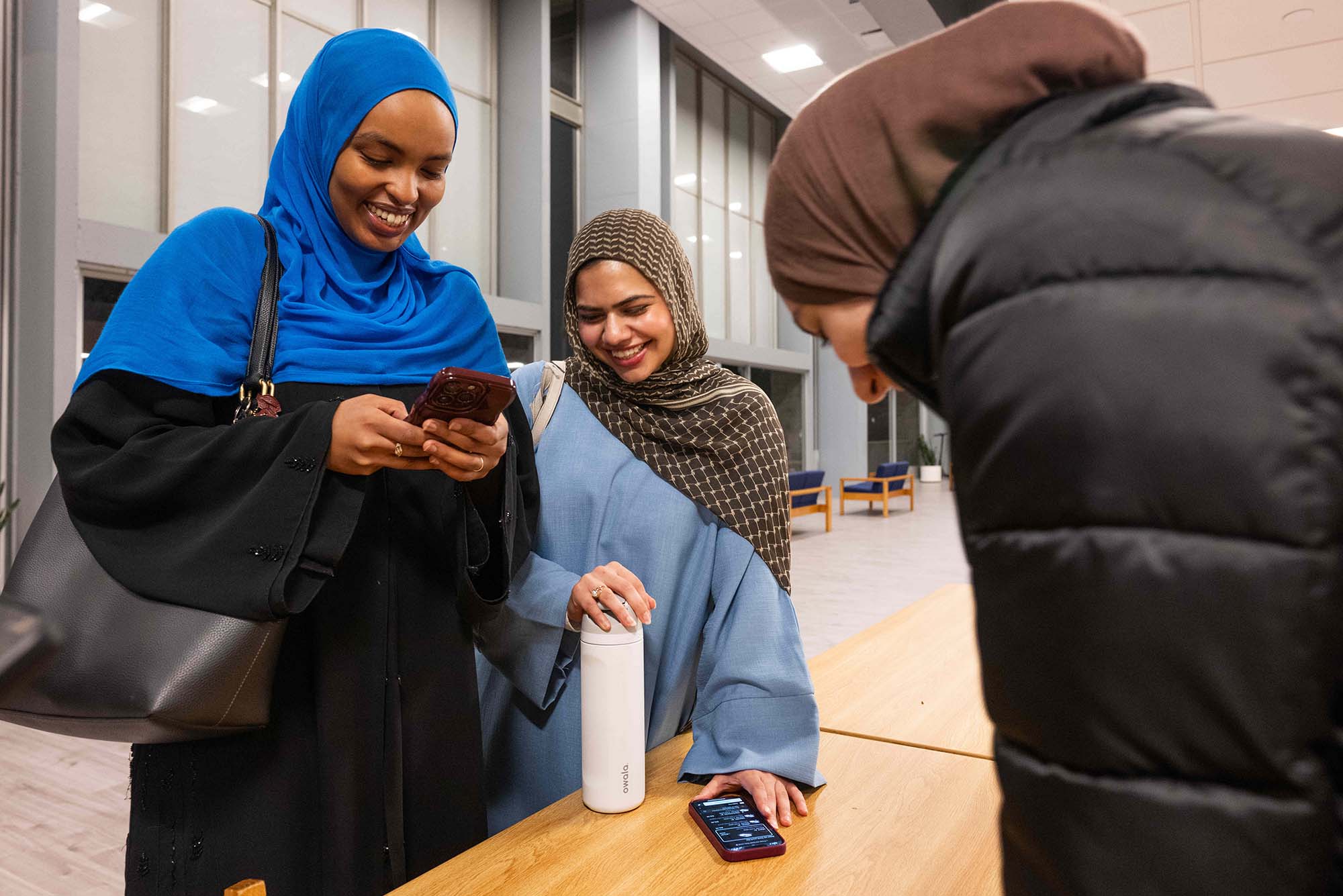
At BU, a community of Muslim students, along with those from area colleges and universities, gathered each night in the Kilachand Honors College lounge to pray Maghrib in congregation. Then groups would walk over to Bay State Underground for iftar meals every weeknight during Ramadan. Sometimes students formed their own communal traditions for breaking the daily fast. Naureen Mallick, a Muslim associate chaplain at BU, says that this year, a group of students went to IHOP for a suhoor meal around 2 am. Another group of students decamped to the terrace of the George Sherman Union for an iftar al fresco.
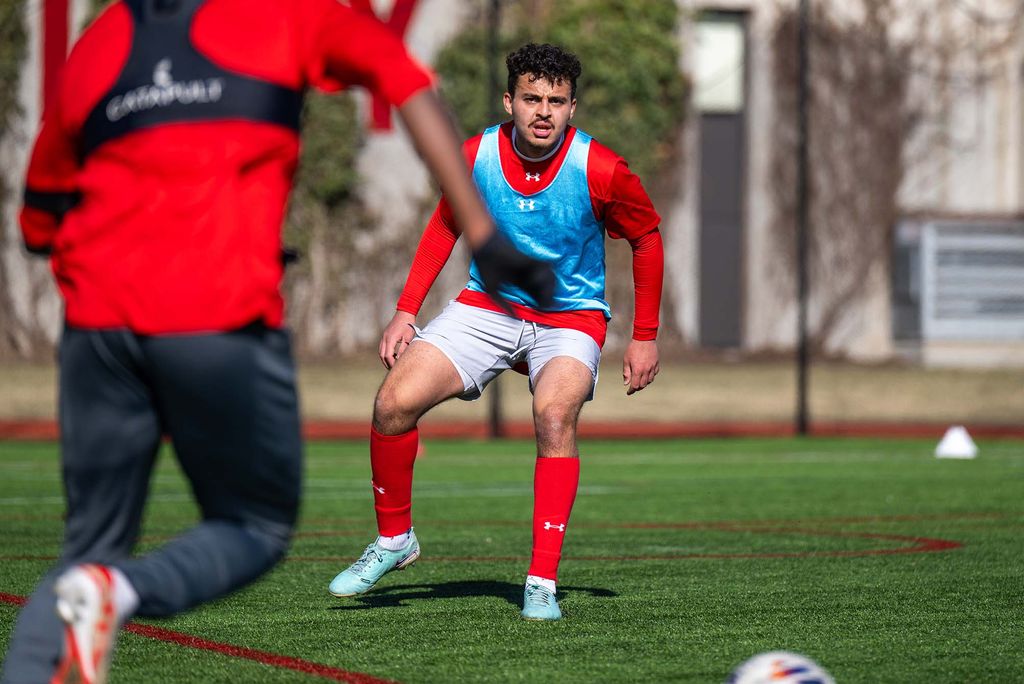
Bashir Khalil (ENG’26) pushing through a BU men’s soccer morning practice on Nickerson Field. “I would definitely say it’s not exactly easy,” Khalil says of the month of fasting. “It’s nice that training is in the morning, as that’s when we have the most energy and have just had our most recent meal for suhoor. However, at the same time, it’s a bit difficult due to the reduction in sleep and the changes to the sleep schedule, especially with having to wake up to pray and eat during the night. Also, having to wait 9 to 10 hours after practice to get a meal to recover after training and lifting is definitely tough, and as the month wears on, it gets harder. But at the end of the day, you know that Allah [God] is with you, and there is no greater strength or power than that. It’s a very blessed month…and at the end of the day, it’s a holy month for all of us.”
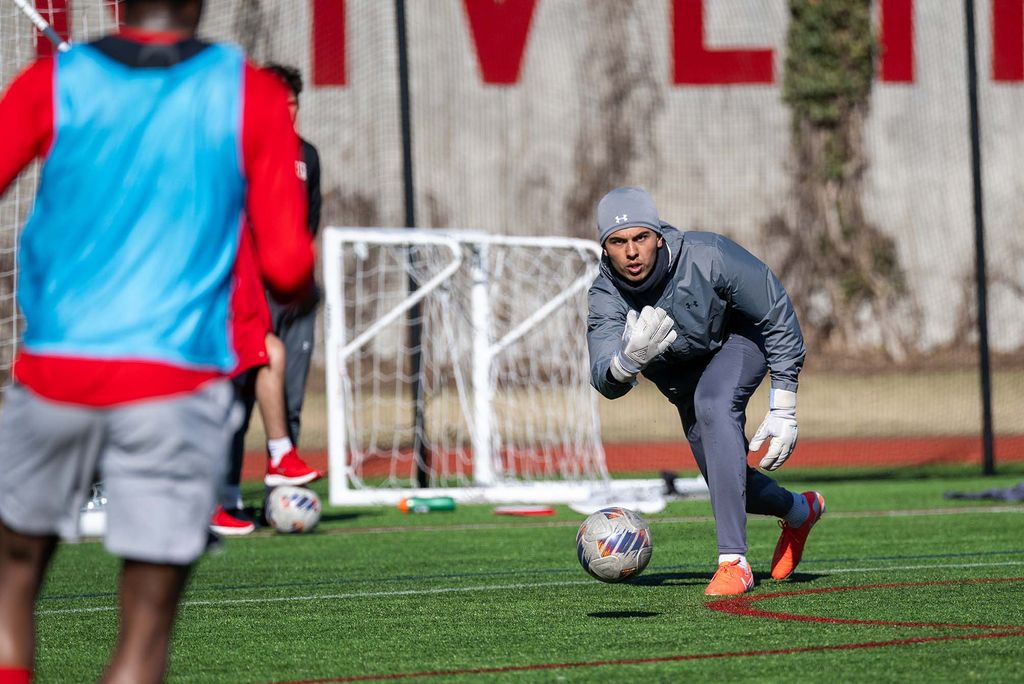
BU men’s soccer goalkeeper Sheraz Saadat (ENG’26) at a morning practice on Nickerson Field. Saadat says that while physical recovery is noticeably longer during the fasting month of Ramadan, “it’s a month that shows you that you are capable of more than you think.”
There’s a common misconception among non-Muslims that Ramadan is a painful, difficult time.
“People hear that we’re not eating between dawn and sunset and they are shocked,” Mallick says. “‘How can you do that?’ they’ll ask. It is intense—by the end of Ramadan, we’re getting precious little sleep—but it’s something that we aspire to do. We like to celebrate, rather than suffer, through it.”
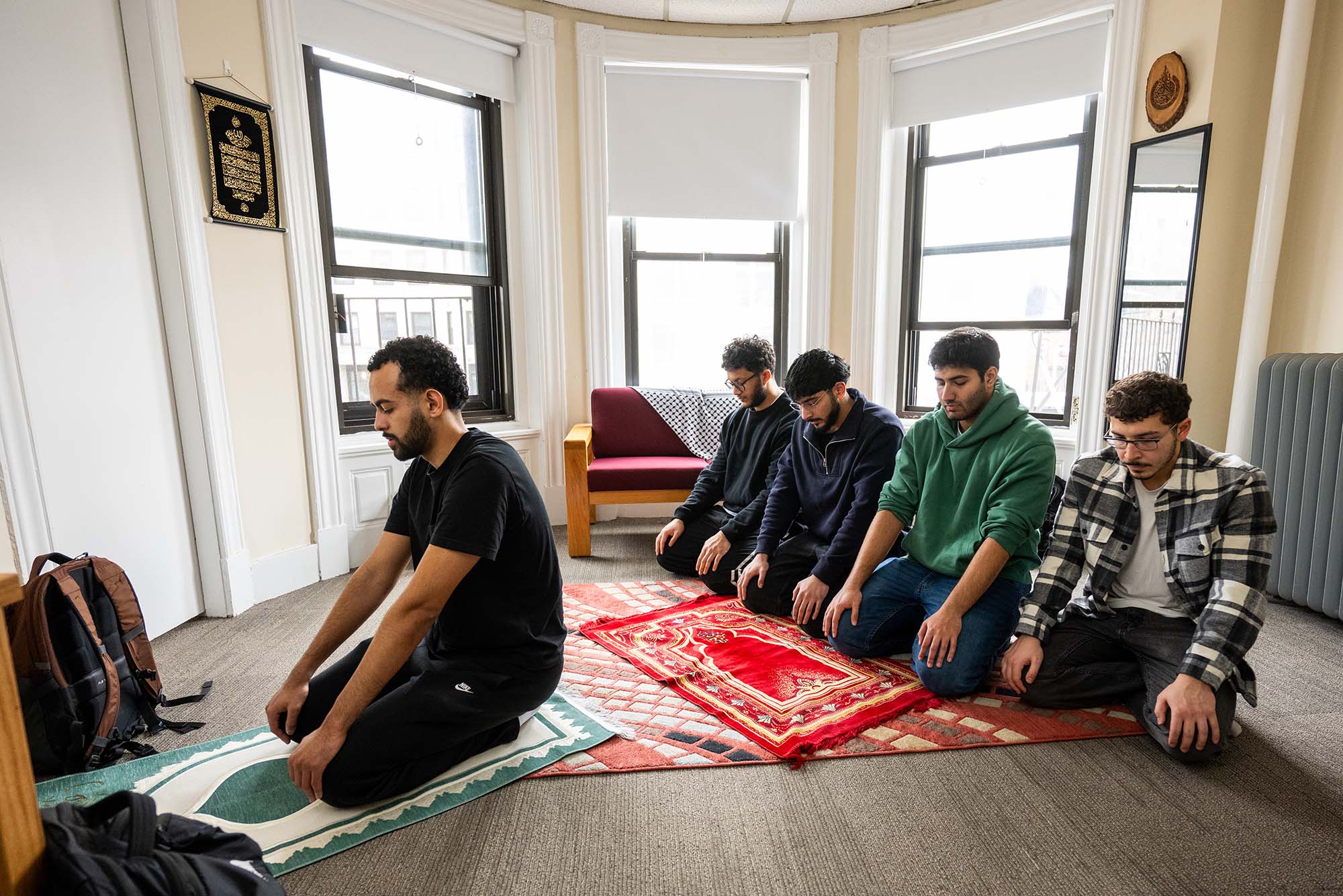
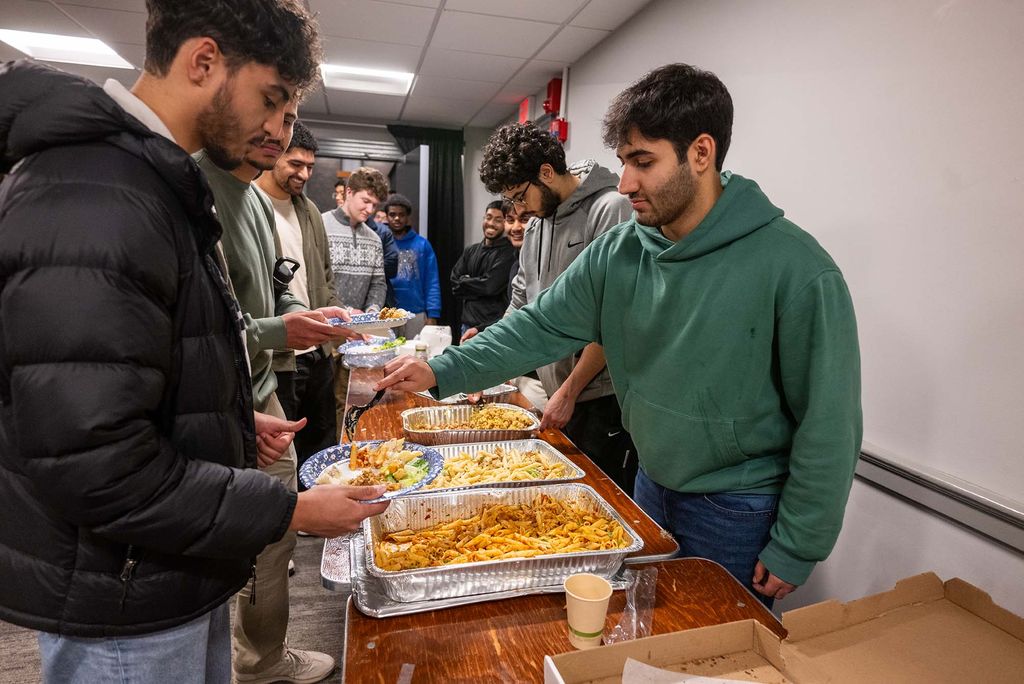
Murtaza Khalil (CAS’27) (right) helping serve at the brother’s potluck iftar in the GSU Terrace Lounge. “Ramadan at BU is a time for Muslim students to slow down, gather, and connect as a group,” Khalil says. “Every event we host, every meal we serve, and every conversation we have is a testament to the values our faith has taught us: that strength is not in what you keep, but in what you are able to give.”
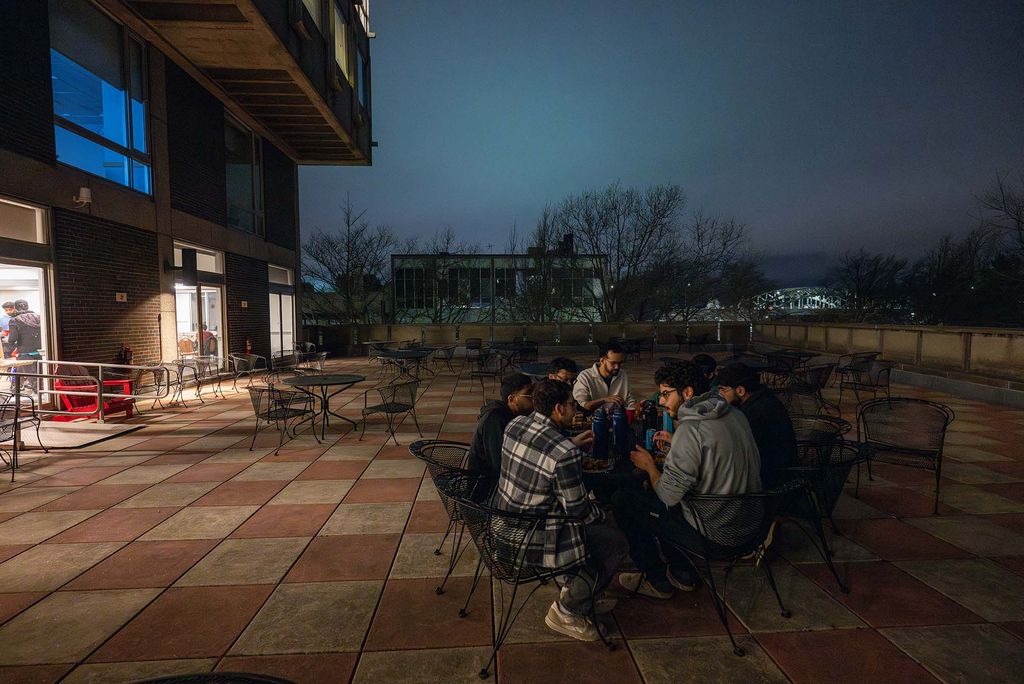
With students from surrounding schools attending, the brothers’ iftar potluck at GSU was nearly standing room only, so a group of friends opted to bring their meals outside to the terrace.
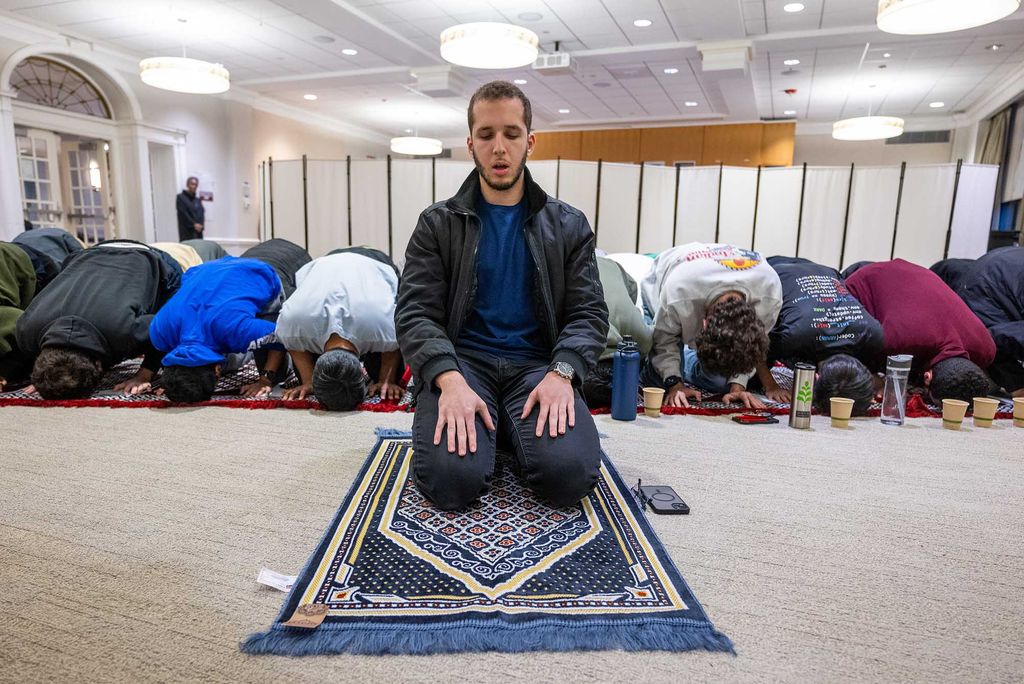
In the KHC lounge-turned–Muslim Prayer Room, Rayan Djelmami-Hani (CAS’26) leads the Maghreb prayer after breaking the day’s fast prior to iftar. “In Islam, leading the prayer isn’t about status,” Djelmami-Hani says. “Rather, it’s about serving your community in that moment and helping everyone come together to worship God. It’s also a reminder to lead with care and humility. Especially during Ramadan, which is such a spiritual and reflective time, it feels really meaningful to be part of something that connects us all, even when we’re far from our families.”
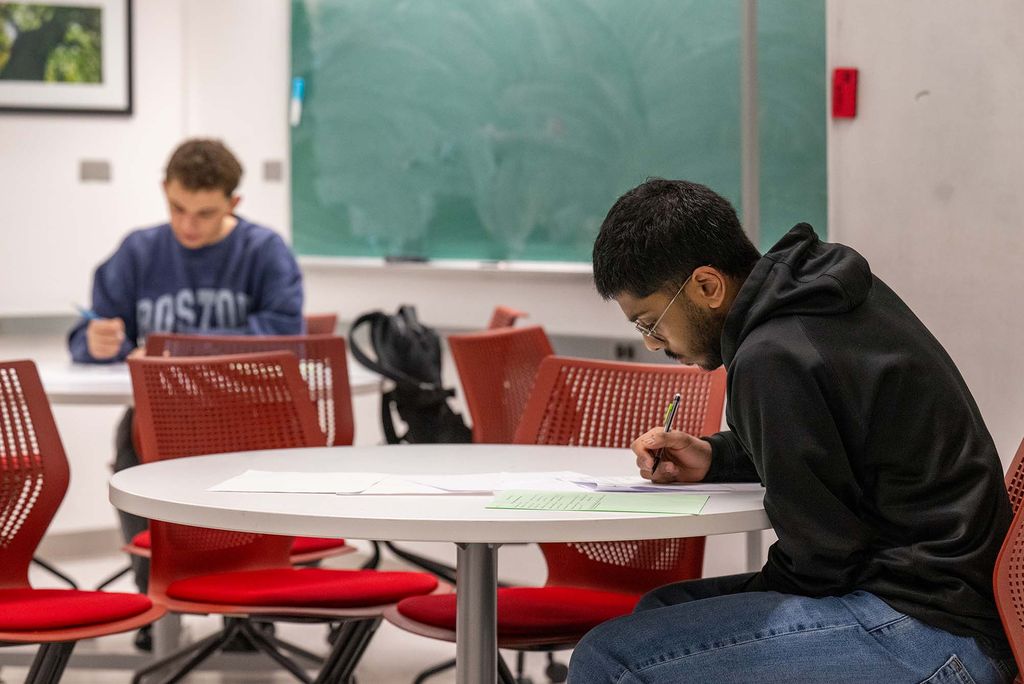
Defrim Berisha (CAS’27) (left) and Humza Izhar (Sargent’26) sitting for an Intro to Physics II exam in the Metcalf Science Center, scheduled at an alternative time—morning—to accommodate those who are fasting. The quiz would normally be during regular class hours, meaning Ramadan observers would have to take the exam at the end of a day of fasting, prior to breaking their fast. This religious accommodation exists under the BU Policy on Religious Observance.
Kamran likens the experience to a spiritual reset—a time to reexamine bad habits and reinforce good ones. In addition to fasting from food and drink during the daylight hours, practitioners also abstain from other activities considered sinful, such as gossiping, drinking, smoking, and lying.
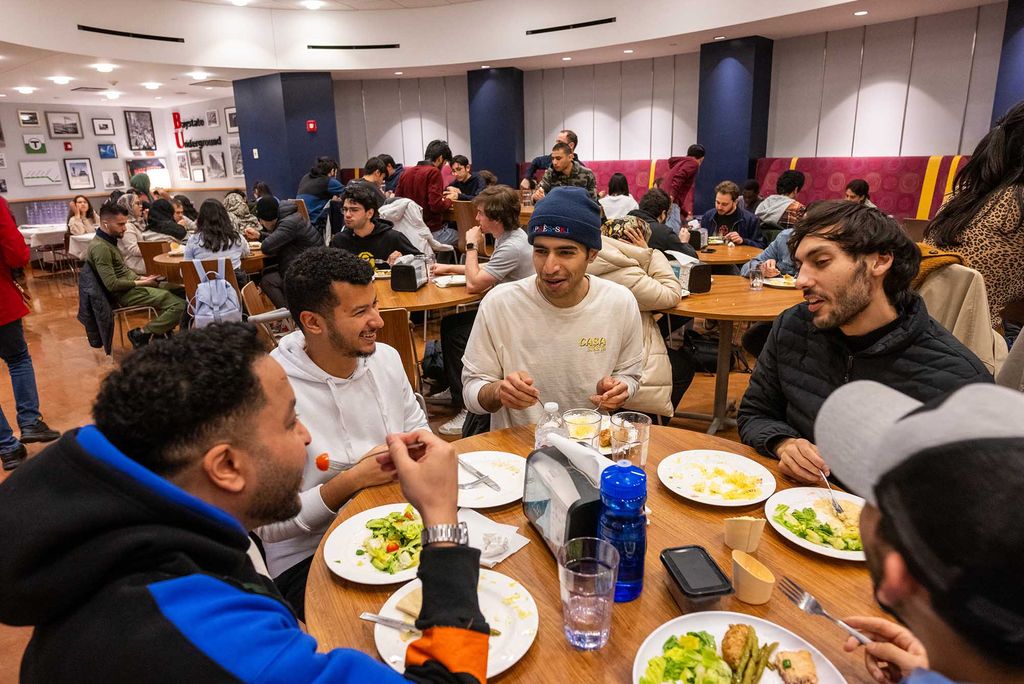
Saad Alsabr (LAW’25) (from left), Faisal Alay (LAW’25), Mohammed Alnassri (LAW’25), and Tarek Aoumaich (LAW’25) during an iftar meal at Bay State Underground.
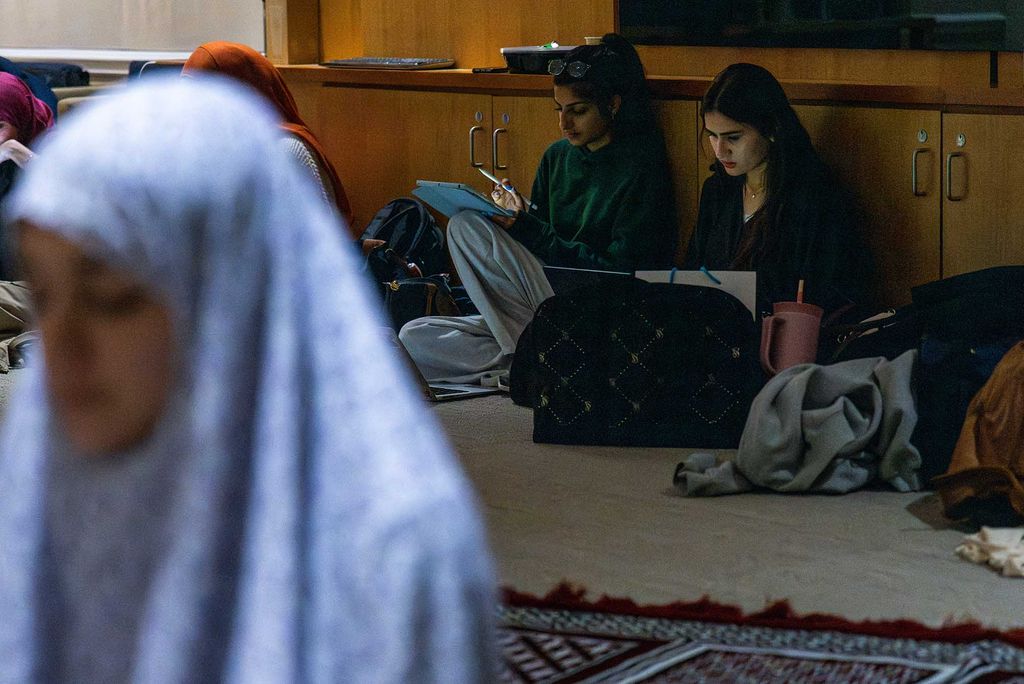
Ayla Aamir (Sargent’25) (left) and Ariba Manal (Sargent’25) studying quietly in the back of the prayer space in the KHC lounge during Taraweeh. Women do not fast or pray during Ramadan while menstruating, but still come to the common spaces for connection with the community. “It’s nice to hear the prayers while studying,” Manal says.
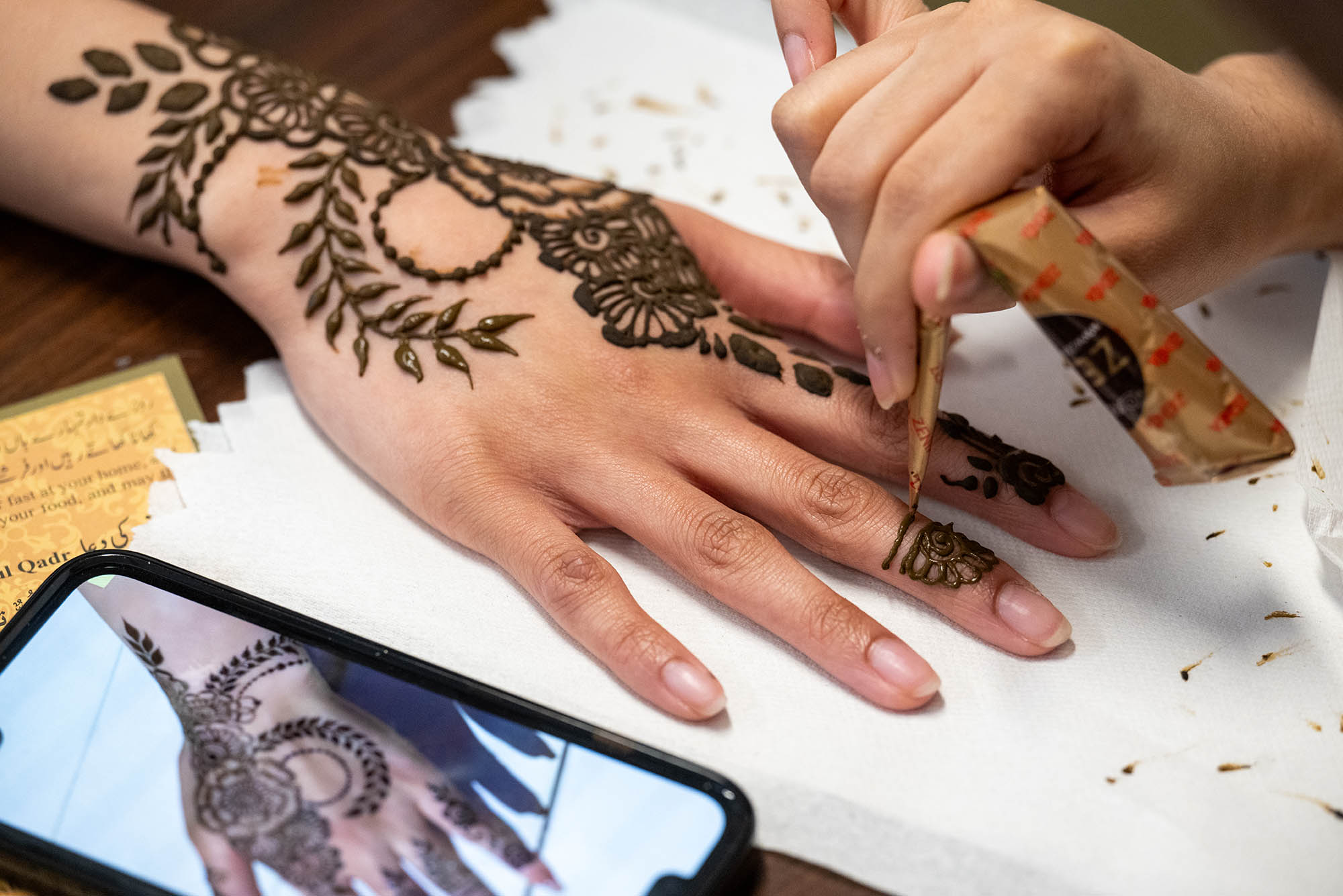
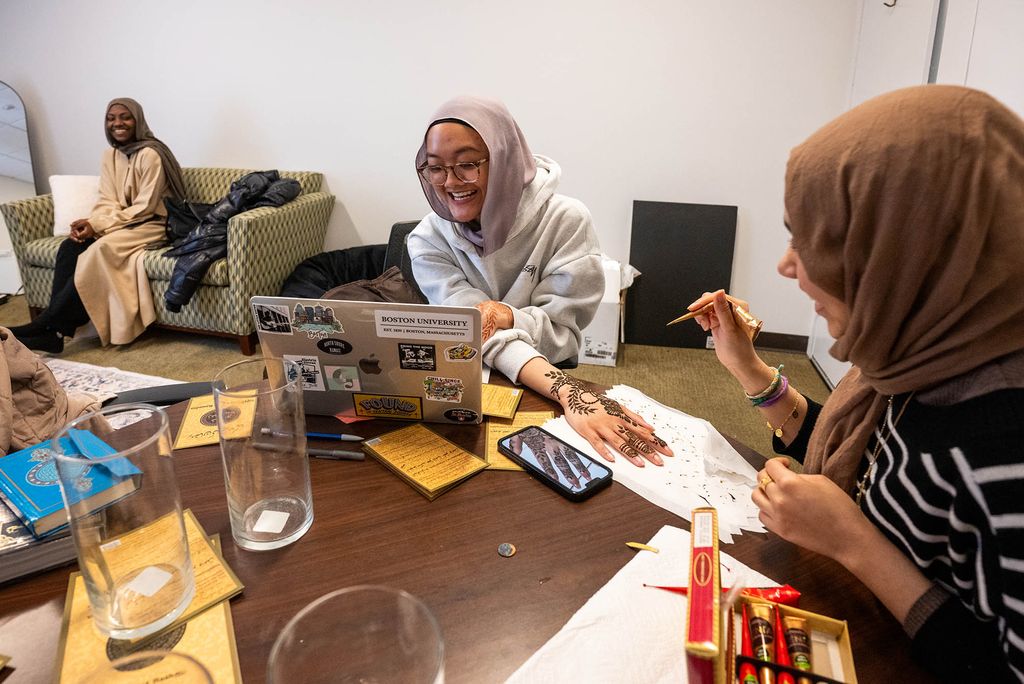
Raheeq Ibrahim (CAS’25) (from left), Raida Utomo (CAS’26), and a student who declined to give her name, talk in the sisters’ lounge in the GSU. Ibrahim was impressed by Utomo’s skill at studying for an exam with one hand on her laptop while getting some henna applied to the other. “Anything to look good for Eid!,” said Utomo, who was catching a flight shortly after her exam to observe Eid with her family in Kentucky.
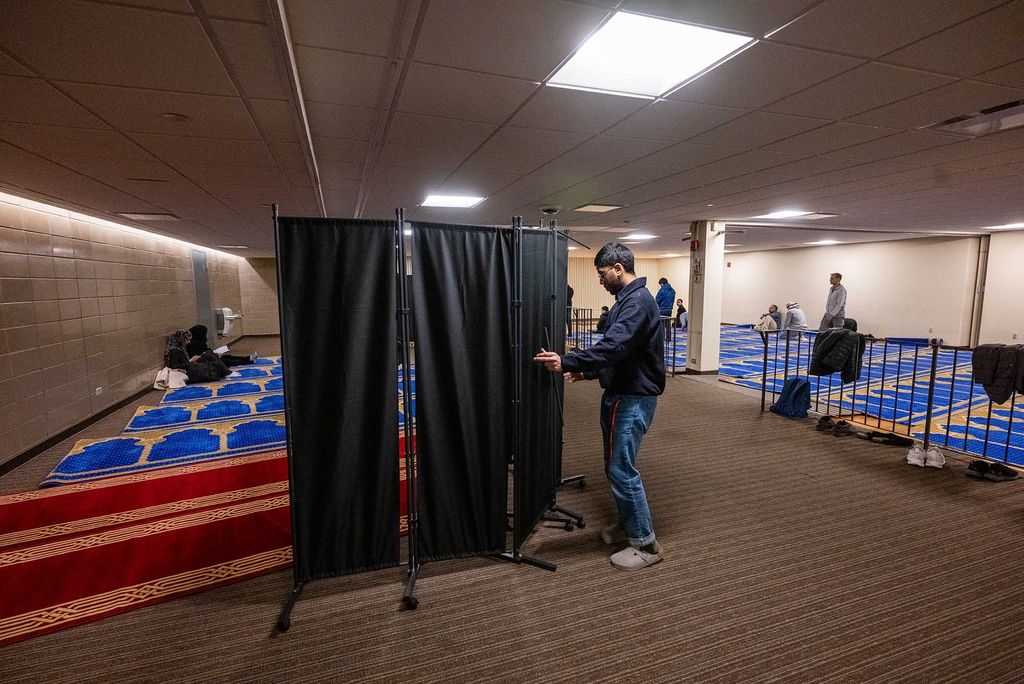
Humza Izhar (Sargent26) adjusting the partition for the Friday afternoon Jummuah prayer in the GSU link. The GSU Link was available for prayers on Fridays and on the weekends when not being used by other groups.
“Food is probably the smallest part of Ramadan,” Kamran says. “When you’re fasting, you should be in a pure state, and you should be focused on reciting the Quran, focused on praying, focused on creating new habits and being consistent in them.
“It’s a time when I feel my best,” she says. “I feel like I’m doing everything I can, and seeing in myself my highest potential. It’s a very simple and satisfying time.”
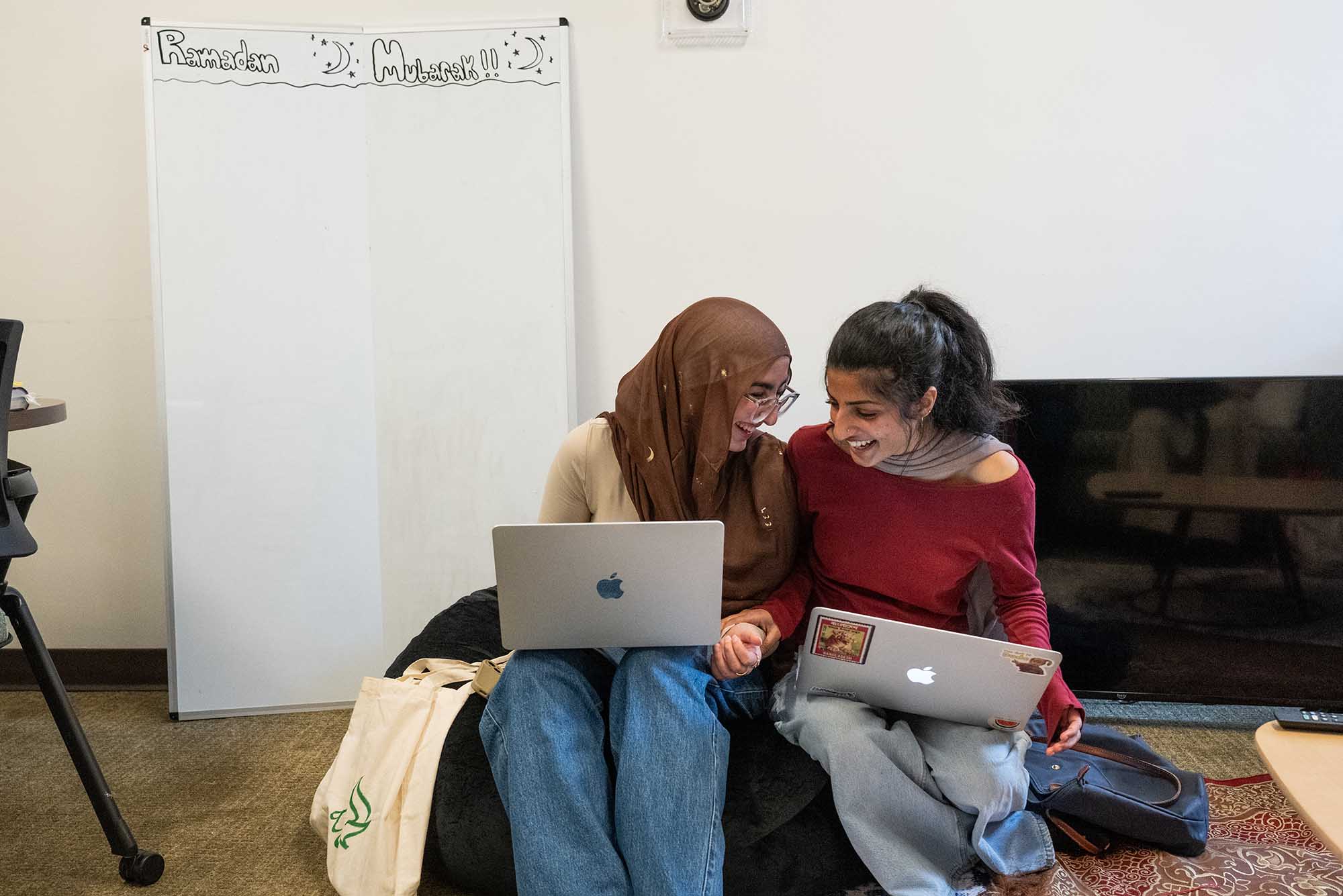
For Kamran, and many students, it’s also a time when the extra demands on their time make juggling school assignments, exams, and athletics particularly tricky. Students can ask for (and receive) religious exemptions that enable them to reschedule labs or exams that fall during prayer times, but otherwise they take on the additional burden gamely.
“We have a saying: May Allah help us see the next Ramadan,” Kamran says, “because it’s a privilege to be able to practice Ramadan.”
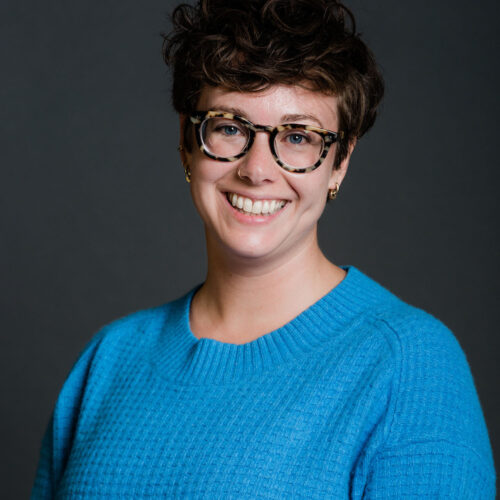

Comments & Discussion
Boston University moderates comments to facilitate an informed, substantive, civil conversation. Abusive, profane, self-promotional, misleading, incoherent or off-topic comments will be rejected. Moderators are staffed during regular business hours (EST) and can only accept comments written in English. Statistics or facts must include a citation or a link to the citation.